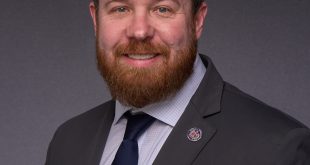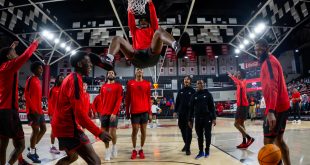Written by Joe Adgie
Some of the brightest minds at VSU showed off their research this week at the Second Annual Campus-Wide Undergraduate Research Symposium on Monday and Tuesday in the Student Union Ballrooms.
This symposium featured research covering a wide variety of topics, such as homelessness among children, the methanol industry, the difference between phone types and why some geographical areas are much hotter than others.
This temperature phenomenon, known as the urban heat island effect, was covered by Chris Ryan, of the department of physics, astronomy, geosciences and engineering studies.
“It’s all about Atlanta being warmer than all of its surrounding areas, even when it’s at the same elevation as (areas) that are at the same elevation as that, and they received more snowfall as Atlanta itself,” Ryan said.
Ryan explained that Atlanta received zero inches of snow accumulation in a 10-year span from 1995 to 2005, while other areas right next to it received between four and 12 inches of snow in the same span.
“The reason behind it is the density of dark-colored asphalt and buildings, which have a lower albedo,” Ryan said. “For people who don’t know that word, it is the ability for an object to absorb or reflect heat and energy. Darker objects will absorb heat, and there’s a lot of that in Atlanta, so it will have a much lower albedo than a vegetated area.”
Ryan also explained that rural areas will be six to eight degrees cooler than Atlanta because of this.
Another topic of research covered the ethanol industry in the United States. Ethanol is being used increasingly as a fuel in automobiles these days. Rodrica Davis, who did the study on the industry, discussed the government subsidies that the ethanol industries receive.
“So far, it’s going pretty good, with the help of the government,” Davis said. “As far as the future goes, there’s a little bit of uncertainty in that regard, because what happens when the government stops?”
Davis also discussed the popularity and efficiency of ethanol compared to gasoline.
“Well, it’s not as popular,” Davis said. “Some people know about it, but it’s got a pretty bad rap thus far, because it’s not as energy-efficient as gasoline. There’s some uncertainty as to if it’s bad for the engine and a car, so a lot of people don’t use it.”
Davis’s adviser, Dr. Michael Noll, discussed the aid that he and other advisers gave their students.
“Everyone has a different approach to this,” Dr. Noll said. “Some advisers might integrate their students directly into their own research, which you have a student who is interested in what you’re doing, helping you with what you’re doing, while also working on their own thesis work.”
Dr. Noll also discussed the aid he gave Davis during the course of his project.
“Rod Davis and I met in an academic sphere, and I was very happy that he was interested in the biofuel industry, and I said, ‘Why don’t you do a thesis on it?’” Noll said. “There’s a big question that we have in the 21st century, what sources of energy we have available that may help us become independent of foreign oil.”
 The Spectator The independent student newspaper of Valdosta State University
The Spectator The independent student newspaper of Valdosta State University




